Drafted? I was only Eighteen years old and not in any hurry to end up dead. I thought my best chances would be in the Merchant Marines. After all, my younger brother, Angelo had done just that a year or so earlier. I got his paperwork and found I had to go to the draft board to be excused from the army before I could go into the merchant marines. An elderly woman named Mary told me I should be ashamed of myself for asking to be released. She said that if I signed you out of the army that would mean a man with a wife and children would have to go in your place. Her manipulation worked, I was ashamed and enlisted in the army right away. | ||||||||
|
From El Cerrito all the new recruits took a Greyhound bus to the presidio in Monterey, CA. From there we went to Fort Ord and South Camp Hood, Texas where we would be trained as “tank destroyers.” Upon my arrival things had changed and I was switched to the infantry and given the pleasure of marching in tank tracks all day. You have to pick your knees way up and step behind the high side of the track into the flat part. It sounds easy, but it’s tiring after awhile. Of course it is harder if you are barely 5 foot 3 inches tall. In Texas I was grouped with a bunch of Oklahoma guys. Because we were training in Texas we believed we would be sent to the South Pacific. | ||||||||
| ||||||||
Much
to my surprise we were sent to Baltimore by train and loaded onto the Queen Mary. | ||||||||
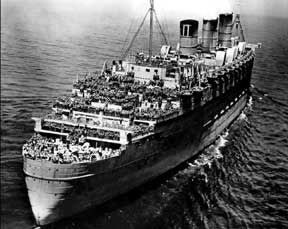 |
Queen
Mary on record breaking voyage |
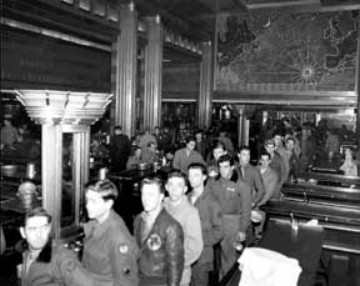 |
Queen
Mary's Dinning Hall |
From Scotland we went to England and from England we went to LaHavre, France where we were put on trucks and sent to the Second Replacement Depot in Epinal. When replacements were needed for the dead or wounded they sent troops from the depot. I was assigned to the 45th Division, 179 infantry regiment, Company B.
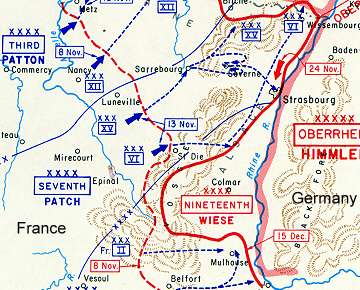
The first thing I was told by his sergeant that I was now a First Scout because of my small size that made me a small target. These guys had been to Sicily, Naples, Rome and other places they were seasoned veterans. It was apparent to me that I was indeed a rookie. I was told not to make friends and the others really did the same. There was one sergeant that took me under his wing and helped me. His name was 'Sampi'. We mostly all had nicknames and mine was 'Shortie'. We would be deployed through southern France, the Rhineland and Central Europe. At the Replacement Depot I was approached by a supply person who was going home. I had an insulated flight suit with zippered pockets, which I offered me since we were both small men. I can tell you that none of the uniforms fit me because I was so small. So I took it. I liked it and on the front line it did not matter if I wore it. The sergeant told me I thought it could be trouble one day. I also found being short meant I had to run even faster to stay ahead of the squad.
I fought during the Battle of Alsace. We were given different assignments. One of the objectives was to block a supply road from the Germans. I was given a crate of grenades and put on a ridge overlooking the road. My orders were to toss a grenade down towards the road every so many minutes until the crate was empty then join back to my unit. I never saw anyone on the road so I guessed it worked. It was one cold winter and it was taking its affect with frostbite and trench foot. The S.S. Mountain Division Germans had found a weak point in our defense and had attacked. They surrounded a bunch of our guys from the 157th Regiment {for more details on the 157th IR's Battle at Reipertswiller}. Those guys couldn't get any supplies. Our 179th regiment B Company was sent to fight those Germans. We tried over and over again to get to them but the Germans fought us off. We were on a hill in a forest and our company formed a defensive line. We had to hold our line against the German offense while being pounded by Mortar and Artillery fire. We had to dig holes that were 4-5 foot deep, 3 foot wide and 6 foot long. If you were lucky enough to find some branches from trees, you laid them across the top of one side of your hole, and then you got your blanket and laid it over the branches. Next you took the dirt from your hole and packed it on top of the blanket. Then you built a mound of dirt facing the enemy and you had a mortar-proof shelter. The only thing that could get you was a direct hit.
My buddy, 'Sampi', was
the seasoned veteran who took me under his wing and taught me how to survive.
Sampi was moving between foxholes in the open next to my hole and I asked him
if he was scared. He told me; "no, you never hear the one that gets you.
By the time you hear the squeal they're past your head.'" So, Sampi is telling
me to count the time between the clicking sound we can hear when the Germans launch
a mortar shell at us. You hear the click when they drop the mortar down the 'stove
pipe' or mortar gun. 'Count, one thousand one, one thousand two'... Just then
I hear a clicking noise and duck down into my hole. Remembering what Sampi says
I start to count when bam! The shell hits 5 foot to the left of where Sampi was
standing. Stunned and knocked down I got back up. The first sounds after the blast
that I could hear when my hearing cleared were some terrible gurgling noises.
Sampi is torn apart from mid-gut up and trying to breathe. I yell 'Medic' and
then fall to my knees. I turned my head and wept. He's the guy who teaches me
how to survive and he was my first buddy I saw die."
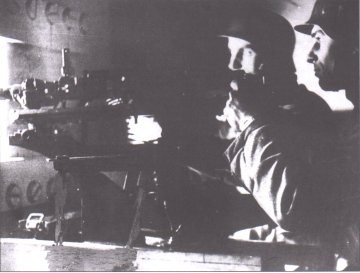
Anyway,
they had machine guns and cannons in their pillboxes and it was our mission to
destroy them and get through their line. To do that, all the guys in your company
would fire at the pillbox while you ran like hell to get up to it, carrying this
big pack board of clay explosives. Once you were there you'd take the pack off,
set it at the door or against the wall of the bunker, pull the fuse and run like
hell for cover. Once a hole was blown in the bunker you came back and threw grenades
inside to make sure the job was done. Taking out these bunkers weakened their
defenses and we could get through. Scary? Not really. After you do the first one
it gets kind of exciting. We made a sort of competition out of it. Those are the
sorts of things you do to make it through this war.
Scary was while in the woods at night having a French Moroccan soldier sneak up on you and put a knife to your throat while feeling your helmet. I cannot believe I could not hear him! If you had a German helmet on your head you were dead. He asked me "Hey Joe you have a cigarette?"
We started our advance into Germany. German resistance was heavy. I finally found out why my sergeant thought the flight suit was not a good idea. I was following the inside bank of a stream bed ahead of the squad. I would look over the edge to see if I could see any of the enemy. I came to a spot that I looked over and saw a group of German soldiers dug in. They also saw me and opened fire. I took off running back to the squad. Part of the way back I slipped into the stream. The flight suit soaked up the water and became too heavy for me to pull myself out of the water completely. The Germans were still firing my way. The sergeant came forward and grabbed me and carried me out of harms way. I got rid of that flight suit.
In another high area in the woods we advanced forward. Being first scout I would be ahead of the second scout by about 75 yards. I was walking through the snow that was almost to my waist when I spotted movement. It was a German machine gun nest. They had not seen me. I signaled that information to the second scout. I knew that they were in range of a rifle grenade. I slowly took out the rifle grenade a put it on my rifle. I waited trying to make up my mind on the right elevation to hold my rifle. I was about to pull the trigger when I heard a terrifying sound of a tank. In the woods you cannot tell if it is theirs or ours. The tank came up behind me and I saw it was ours. I pointed to the Germans and the tank turned its turret towards them and fired. The muzzle blast hurt my ears and made them ring. I then took off the grenade and found out that I had not put in a blank clip. The tank had saved my life because if I had fired my rifle it would have blown up!
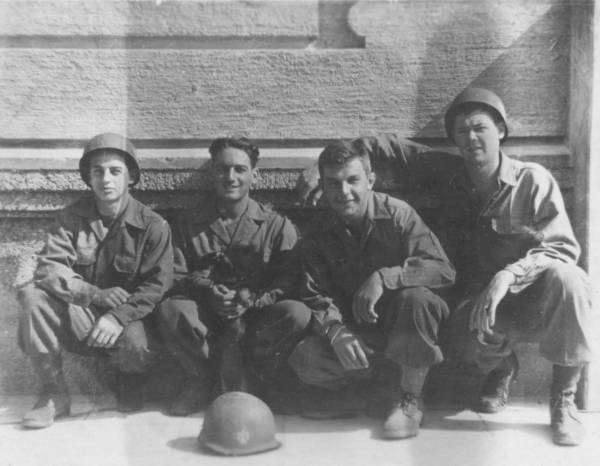
By now our mission was to find the SS and make prisoners out of them. We had special orders that we were not to talk to them at all, just take them into custody. We always knew when we had captured someone in the SS because they had SS tattoos on the inside of their right arms. We would find a German and rip their shirts off of them to see their arms. These Brits we had with us hated the Germans. They always seemed to volunteer to take the SS prisoners back to the M.P.'s. Somehow they always seemed to try to escape or do something that got them shot or beaten. I felt that their actions were no damned better than the Nazis. I guess you'd better not write that either.
They told us about the Germans gassing the Jews. They told us about women being raped and tortured. They had heard rumors of wicked experiments. I had figured they just said all this stuff to justify what they were doing. I hated those guys for what they were during and I was glad to leave them in Munich.
"You know the regular army (German army) guys just followed orders. They were scared to death of what would happen to them if they didn't. The SS guys liked what they did because they enjoyed it. I don't know what the hell I would have done if I were a regular German army guy. I always felt sorry for them. It was hard to tell but they were glad to see us. Sure, maybe they were afraid and wanted to kiss our butts to keep from being shot, but I think it was because they were damned glad it wasn't the SS or Gestapo. I think maybe they were thanking God they didn't have to worry about them messing with them anymore. You should think about that next Veteran's or Memorial Day, shouldn't those men have a right to one in their country? Not the SS but the regular guys? I don't know how I feel about that.
We fought hard in Germany taking the territory from the Germans. Nuremberg was a hard fought door-to-door city. We thought Munich would be worse.
We got deeper into Germany by riding tanks on the autobahn. You know how they always have those new car commercials, the ones with the nice sports car going fast? Well, we rode on the top of the tanks on that road. We had walked all over Europe and were glad to ride for a while.
When we heard shooting we would jump down and hide in the ditches. The Germans had hidden all kinds of planes and 88 caliber cannons down there in the trees and the bushes along the autobahn. Whenever we would find them we would drop a phosphorus grenade into the cockpits or into the breaches of the cannons to disable them and make sure they were out of commission.
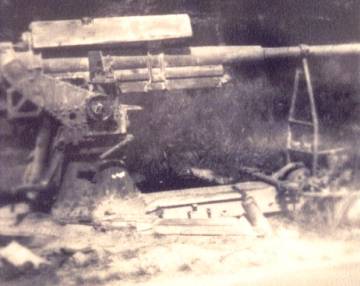
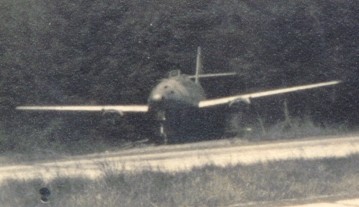
Know what else we found? Empty 55-gallon drums and barrels. Hundreds of them. The Germans had troops all over Europe and Africa. They were just about everywhere and they used gasoline to get there. I think we won the war earlier because the Germans were out of fuel. I honestly believe that. Things might not have been so good for us all if they had had more fuel. If you write that in your paper, they won't believe it, but I think it's true. The next city was Munich that was the center of Nazism, which we took in a day. The next day we rested.
The next city was Munich that was the center of Nazism, which we took in a day. The next day we rested.
From Munich we kept moving. We were advancing straight toward Dachau, but we didn't know it. {Editor's note: Dachau and the Liberation thereof is a complicated subject. There is the city of Dachau, Germany where the Concentration camp derives it's name. The main Camp KL Dachau which is near the city and has a large SS Complex was liberated, on the 29th of April, by 3rd Battalion, 157th Infantry Regiment. Several Sub-Camps were spread throughout the region and Veterans generally refer to them all as Dachau. On the 3rd of May the 179th was assigned to secure the Dachau camps. On the 8th of May the 179th was relieved of duties at Dachau and moved back to Munich.} It was still cold. We were advancing right along and all of a sudden I smelled this horrible odor. I signaled gas! We panicked because we thought we were being gassed. The army had issued all of us gas masks but about half the guys got rid of theirs because they were a pain in the ass to carry. Those of us who still had ours put them on right away. We hated wearing them, they stunk to high heaven, but we wore them and watched to see what happened to the other guys. After a few minutes we knew were weren't getting gassed because the guys without masks were doing ok. We took our masks off and the smell was unbelievable. Of course we were far away and as we got closer the smell got worse. I remember one guy commenting I was glad it wasn't summer or hot. We kept advancing, the smell got worse and suddenly we find out what stinks. I walked up on a ditch less than a half of a mile from Dachau.
" There was a ditch full of bodies. Thousands of bodies. They are piled everywhere. There are some ditches filled with bodies and dirt and lye. The bigger ditches are all packed full of these people, all dead and decaying. Next to the ditch was a wagon that had a half round carrying box.
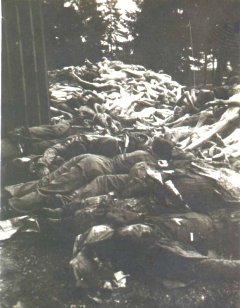
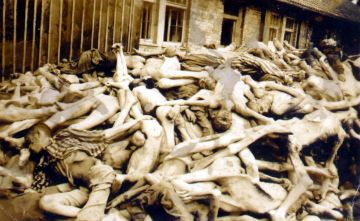
A half-mile ahead I came to a wire fence. This fence was as far as you can see. In the camp behind the fences we see people. You cannot believe what these people looked like. They are wearing these filthy clothes; threadbare, filthy, striped pajama like clothes that just hang on them. They look like moving skeletons. They looked so thin that you just couldn't believe they could walk or move. They are standing there sort of scared at first and then they realize we are there to help them. The Germans had left before we got there. These people were just waiting to see who would come. The sergeant called my name "Moscarelli" and the people behind the fence started calling out in Italian "Mangia, mangia" (eat, eat)
We started throwing
them our K-rations and our C-rations and anything else we had that was edible.
A few hours later a jeep came and told us not to feed them. I have wondered for
years if we saved them or killed them by giving them that stuff. You couldn't
see this and do nothing. You couldn't stand there looking at these poor starving
people and do nothing. You know that movie, Schindler's List? It was just like
that; just exactly like that, except the smell. I can't ever forget that smell.
We took pictures of what we found. I still have them. We didn't do it because
it was a novelty or some curiosity. We took pictures because we thought no one
would believe us. We wanted proof of what was there so no one could say it wasn't.
I think we wanted pictures so we could believe it.
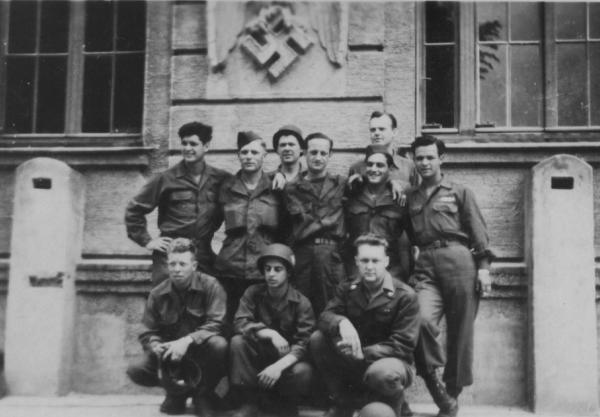
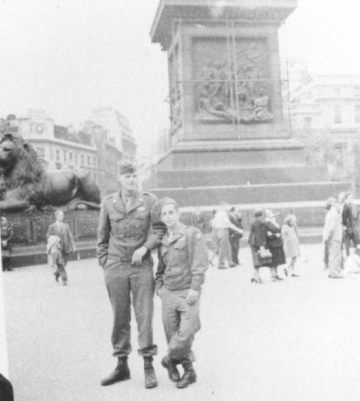
They sent us back to Munich and then camp 'Lucky Strike' after that. I have a Nazi Banner/flag signed by some of the guys in my company. Thirty -five of my buddies in our company, that's how many we started out with, thirty-five. By the time we got back to camp Lucky Strike there were only eight of us left. Eight. They never debriefed us or anything. One minute we were in Dachau, and then we were in Lucky Strike. We talked it out among ourselves and treated it like it was just another part of war. We had to do that to survive.
In Germany there were a lot of orphaned children. I got attached to a ten year old German girl that I tried to adopt. I went through all channels and then tried to use my mother. I could not do anything and nobody was helping her. I just was stuck burying money for her so she would not go hungry.
"Once we were back in camp that had us go on a march with just our day packs on. While we were gone they went into our tents and searched for our war souvenirs and took them. They buried most of it. Guns, swords and other stuff all got buried. I think they kept some things but they buried all this stuff and made us march over the top to hide the places afterwards. I have often wondered who went back to find the big crates of stuff and dig them up. After we did that, they gave us leave and sent us back home. We marched for hours and then they told us to break camp we were going home.
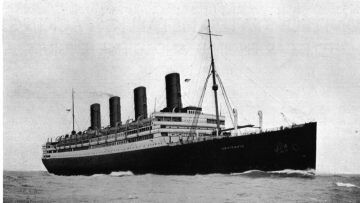
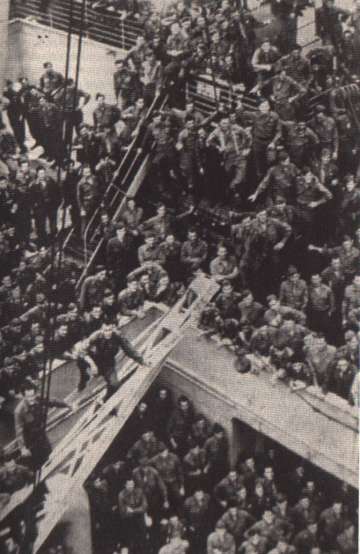
"They sent us home on the Aquitania. As they were arriving back to the states all of the soldiers wanted to get a look at the Statue of Liberty. It seemed appropriate to see the symbol of the freedom they were fighting for. All these men ran to one side of the ship and fought for good vantage points. Dad said at first they humored the men, after all, they had been fighting for freedom, but soon they were yelled at and half of them were ordered to the other side. Dad said they couldn't steer the ship with it listing to one side. It's difficult for me to imagine that and as I quietly wonder about it I said, "We all got a look at Liberty from the largest passenger ship in the world." I decided not to challenge the idea that the ship was listing. We were sent back to Baltimore. It had only been a few months since we went into Dachau and now we were back home.
It was unreal. They flew us west coast boys to Chicago in old bombers that had been converted. We had to refuel there in Chicago and two other stops in order to make it all the way to California. I got separated from my buddies and had to board a different bomber to get to Chicago. I thought, no problem when we refuel I jump on board with them. When we got into Chicago we circled and circled the airport. We were up there for a long time and come to find out that the bomber with my buddies on it had crashed there in Chicago and all the boys died. I would have been dead like my buddies. Ever since that day in the foxhole I have felt like I lived under a lucky star.
When we got back to California they sent us to Pittsburgh to try and work the meanness out of us. I guess our attitudes after what we saw were just to big for them to break there. They sent us to a base in Washington that was all red brick and polished bronze doors. For about a week they made us walk around with a can of 'Brasso' in our hands and we polished doors, like that was going to get to us after what we had seen and been through. Then, they ship us to San Francisco to march in the Army Parade and discharge us.
I found my fathers Nazi banner
and was able to contact John Pigion whose name was on it. He supplied the picture
of my father and him. He also sent one other picture of Dachau. John said he remembers
my father and the German machine gun nest and then the tank in the snow. He told
me that the lieutenant told him if Shortie takes out the nest he would put him
in for a Bronze Star. John did not know about the live shell in the chamber.
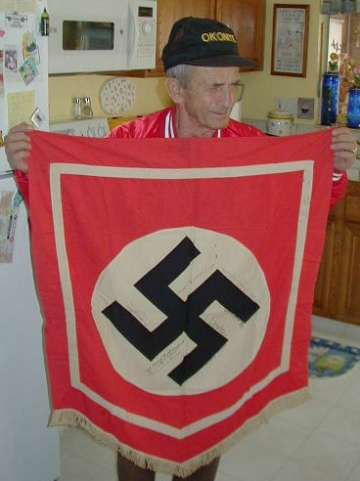
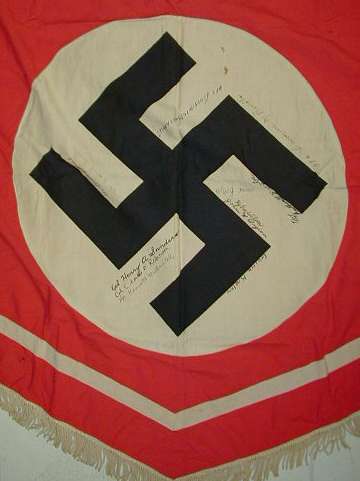
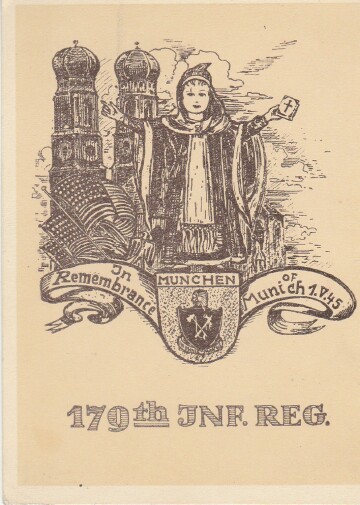
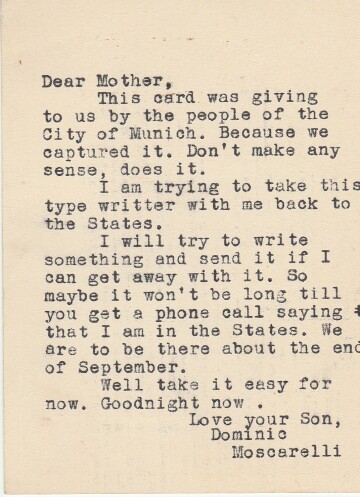
last revision